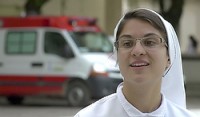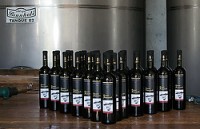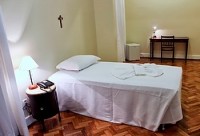July 16, 2013 // Uncategorized
Preparing for World Youth Day
Pope Francis visits Pope Benedict, asks him to join WYD in prayer
By Cindy Wooden
VATICAN CITY (CNS) — Pope Francis paid a personal visit to retired Pope Benedict XVI, informing him about the final details for World Youth Day in Rio de Janeiro and asking him to pray for Pope Francis and for the pilgrims who will gather in Rio July 23-28.
During the visit, which lasted about 30 minutes July 19, Pope Francis gave his predecessor a booklet with a detailed account of the trip itinerary, along with the times the events will be broadcast in Italy, “so that he can spiritually participate in the events and, if he’d like to, follow the broadcasts,” said Jesuit Father Federico Lombardi, Vatican spokesman.
Pope Francis also gave Pope Benedict one of the commemorative medals minted for the Brazil trip. On one side is a relief of Pope Francis in profile; on the reverse is a reproduction of the famous Rio statue of Christ with his arms outstretched and the words “Rio 2013 World Youth Day” — in Portuguese.
“Benedict XVI assured him of his prayers, recalling his intense and marvelous experiences at previous world gatherings with young people in Cologne, Sydney and Madrid,” Father Lombardi said.
Pope Benedict chose Rio as the site of World Youth Day 2013 and announced his choice at the end of World Youth Day 2011 in Madrid. He also chose the theme, “Go and make disciples of all nations.”
The spokesman said Pope Francis’ visit to the Mater Ecclesiae Monastery where Pope Benedict lives began with the two praying together in the chapel and continued with “a pleasant conversation.”
The monastery is in the Vatican Gardens to the north of St. Peter’s Basilica. Pope Francis lives in the Domus Sanctae Marthae, which is to the south of the basilica.
In Sao Paulo parish, Australian pilgrims welcomed like family
By Lise Alves
SAO PAULO (CNS) — For thousands of young people, the week preceding World Youth Day was their first experience meeting Catholics of other nations and cultures.
A group of young people from Australia spent Mission Week, as it was called, interacting with parishioners at St. Jude Thaddeus Parish in Sao Paulo.
“The welcoming we have received here in Sao Paulo and at this parish has been overwhelming,” Father Peter Zwaans of Adelaide told Catholic News Service July 18.
Father Zwaans is part of a group of 17 pilgrims from the Archdiocese of Adelaide and the Diocese of Port Pirie who joined 16 other pilgrims from the Darwin Diocese at St. Jude’s.
“The youths are between 18 and 34, and include teachers, seminarians and priests,” said Lisa McCormick, coordinator for the Adelaide-Port Pirie group.
Hannah Stavrou, 18, was the youngest member of the group. She said she was struck by how differently people in Brazil practice Catholicism.
“During the very first Mass, I was amazed by the number of young people attending. There was a lot of chanting and dancing,” she said, smiling.
“The overall joyfulness was captivating. I didn’t know they (worshippers) were so lively,” she added.
The group spent the first day walking through the Sacred Heart of Jesus Community, known as the Mauro Community. But even with the depressing slum-like conditions, Stavrou said, she was surprised with happiness of the population as a whole.
Following the group quietly was Jacinta Crocombe, the only Aboriginal pilgrim from the Murrinh-Patha tribe. Crocombe said little, preferring to wrap herself in the Aboriginal flag she brought from home. She stayed close to Melissa Anderson, a teacher who works with the Aboriginal population in the Northern Territory.
With a little coaxing, she told CNS that although she attended the World Youth Day in Sydney in 2008, this was the first time she had traveled on large airplane.
“This is very nice,” she said. “Catholic missionaries came many years ago to our community, and there are many Catholics in my tribe, but they could not come.”
On July 18, the group visited an orphanage and an institute for children, both run by the parish. The orphanage currently holds 22 children, ages 5 months to 17 years, placed there temporarily by the courts until the Brazilian justice system decides their fate.
At the Father Gregorio Westrupp Socio-Educational Institute, 360 children ages 6-16 attend afterschool activities and receive educational help. The Australians spent the afternoon playing with the children and trying to learn a few words of Portuguese before heading to Rio de Janeiro July 21.
Many of those who are going to World Youth Day for the first time have been turning to Father Zwaans for guidance. In addition to being a veteran of the Sydney celebration, he traveled to Toronto in 2002.
He said World Youth Day celebrations can actually change a person’s life.
“It was at the World Youth Day in Toronto that I found my calling,” he said. “When John Paul II told us that if we felt the calling for priesthood not to be afraid, I knew that was what I wanted to do the rest of my life.”
McCormick said World Youth Day promised to be a once-in-a-lifetime experience, and she hoped the young pilgrims would be able to take back to their parishes some of what they have seen and felt in Brazil, especially since their region did not have a lot of Catholics.
“I hope that these young people go back to Australia, talk about their experience and attract more to the calling of God,” she said.
According to the Pastoral Research Office at the Australian Catholic Bishops’ Conference, 25.3 percent of Australians and 22.7 percent of Australian Aborigines are Catholic.
Father Zwaans said that in Sao Paulo, during Mission Week, the young people learned their first lesson.
“The welcoming we have had at this parish is a sort of welcome you receive from family, not from acquaintances or just friends. This shows us that the church is indeed a family,” he said.
In Rio, Franciscan hospital awaits papal visit as ‘confirmation’
By Francis X. Rocca

Franciscan Sister Angela Alves da Cruz talks to Catholic News Service outside Rio de Janeiro’s Hospital of St. Francis of Assisi, where Pope Francis will visit July 24 during his trip to Brazil for World Youth Day. (CNS photo/Robert Duncan) (July 18, 2013)
RIO DE JANEIRO (CNS) — The week before Pope Francis was due to visit, Franciscan friars and sisters were excitedly preparing the Hospital of St. Francis of Assisi, setting up a refurbished chapel where the pope will pray and rehearsing a hymn they will sing for him.
The religious, members of the Fraternity of St. Francis of the Providence of God, regard the pope’s visit, scheduled for July 24, as the “confirmation of our path and of our calling,” said Brother Isaac Prudencio, the hospital’s vice director. “It’s as if God descended upon earth and said, ‘you are on the right path.’
“We are preparing for a great moment of evangelization inside the hospital,” he said. “We are preparing people’s hearts.”
Yet, Brother Prudencio said the hospital was not overplanning the greeting for its guest.
“What we say at that time will be from our hearts,” he said, noting that Pope Francis himself “tends to break protocol.”
“We are waiting for his cue so that we can share our feelings with him,” Brother Prudencio said.
The boyish-looking friar, who at 28 still wears braces on his teeth, was actually a senior member of the religious awaiting the pope at the hospital; many were barely out of their teens. That was fitting, of course, since the pope’s visit to Brazil, the first international trip of his pontificate, will be for World Youth Day.
Pope Francis personally added the hospital to his Rio itinerary, which had been planned under his predecessor, Pope Benedict XVI.
The Vatican spokesman, Jesuit Father Federico Lombardi, told reporters in Rome July 17 that the pope intended the hospital, located in the working-class Tijuca district of northern Rio, to symbolize “all those working with poor, the marginalized and those struggling with addiction.”
During his visit, Pope Francis will inaugurate a new wing of the hospital dedicated to the psychiatric treatment of drug addicts, including users of crack cocaine, who represent 3 percent of the population of Brazil, according to the World Health Organization statistics cited by the hospital. The city of Rio estimates there are 6,000 crack users in the city alone.
Representatives of other Catholic institutions in the same field have been invited to the event. Among them is Franciscan Father Hans Stapel, the German founder of the Fazenda da Esperanca, or Farm of Hope, a church-run drug rehabilitation center in rural Brazil that Pope Benedict visited in 2007.
Fifteen-year-old Carlos Francisco Tarige Britto, whose father overcame drug dependency in the Rio hospital, will present the pope with a St. Francis of Assisi sculpture, made by another former patient.
“It’s incredible to me that he is coming to Brazil and that I will have a chance to meet him,” Britto said. “I’m very emotional. On the spot, I don’t even know if I’ll be able to talk. I’ll ask him for his blessing.”
– – –
Editors: A video story about this hospital can be found at http://www.youtube.com/watch?v=zw-ky4x__gM.
Brazilian family vineyards to provide wine for pope in Aparecida
By Lise Alves

Bottles of Brunholi wine are displayed at the vineyard in Jundiai, Brazil, July 17. The Brunholis, who produce approximately 80,000 to 100,000 liters of wine per year, will supply wine to be served during Mass celebrated by Pope Francis July 24 in Aparecida. (CNS photo/Lise Alves)
JUNDIAI, Brazil (CNS) — Pope Francis’ visit to Aparecida July 24 has a special meaning for two families who have been asked to provide the wine Pope Francis will use at Mass and a luncheon.
Both vineyards are located in Jundiai, about 40 miles outside the city of Sao Paulo.
The Maziero family vineyard — like the vineyards of the nearly two dozen other wine producers in the region — is small.
“We have 10 workers to help out,” chuckles Clemente Maziero, whose grandfather came over from Italy in the late 1800s, settled in the region and started to grow grapes to make wine. Maziero said that during the harvest, January through March, he might hire two or three extra hands to help out.
“It is a family operation as it was when my grandfather ran it,” he said.
His winery, or cellar, produces only 60,000 liters of wine per year, and he sells all of his bottles in a little store, located within the property.
“We don’t sell the wine in supermarkets or specialty stores. If you want it, you have to come by and pick it up,” he said.
Maziero said the family is extremely honored to have been asked to supply 60 bottles of white and rose wines for Pope Francis’ luncheon with bishops and seminarians in Aparecida.
This is not the first time his wines have been served to a pope.
“In 2007, when Pope Benedict XVI came to Aparecida, we were also asked to supply some of the wines used,” he told Catholic News Service proudly.
Less than three miles away, the Brunholi family says the request to supply the wine to be used at the Mass celebrated by Pope Francis came as a surprise.
“We never expected it,” said Paulo Brunholi, who runs the business his great-grandfather started after emigrating from Italy in 1889.
The Brunholis produce approximately 80,000 to 100,000 liters of wine per year. They produce 13 types of wine, although not all of them are from the grapes harvested in their vineyards.
“We obtain red grapes from the South to produce our red wines, but they are still made like they were when my great-grandfather was alive,” Brunholi said.
He said that the region produces a robust wine, with regional taste, very different from the fine red wine usually found in stores.
“It has lower sugar content, so the taste is more pronounced,” he said.
He added that the only request church officials made was that the words “wine for Mass” be inserted on the 80 bottles of red wine supplied.
Brunholi said he believed he was asked to supply the wine for the Mass because he has also been a supplier of the sacramental wine for St. Benedict Monastery in Sao Paulo City.
On July 24 his father, Arnaldo Brunholi, will be sitting in one of the first rows at the Shrine of Our Lady of Aparecida, with the knowledge that the wine served in the mass came from his family’s land. “We just feel exceptionally honored that the pope will try one of our wines.”
The wine served at World Youth Day in Rio de Janeiro will be provided by Salton, from Rio Grande do Sul.
Papal menu planners try to keep it simple yet sweet for World Youth Day
By Carol Glatz

The bedroom Pope Francis will be staying in when he visits Brazil is a sparsely furnished one at the church-run Sumare Residence. The room is pictured in a handout photo from the Pontifical Council for Social Communications. (CNS)
VATICAN CITY (CNS) — Sweet and simple: That’s the menu plan for Pope Francis when he stays at a church-run residence during his visit to Rio de Janeiro for World Youth Day.
However, Good Counsel Sister Terezinha Fernandes, who is in charge of the kitchen at the Sumare Residence, said that when she was dreaming up the dishes, “I had to hold myself back” to not let the table fare get too fancy.
Meals will consist of rice and beans, and some Brazilian specialties like cheese bread and “doce de leite” — a dessert made from carmelized sweetened milk, she told the Italian Catholic newspaper, Avvenire, July 16.
About 30 visiting cardinals will be staying at the same residence and eating from the same menu in the common dining room, she said.
Sister Terezinha said they will be welcoming the pope “as he requested us to: with simplicity,” but also with plenty of “boundless joy.”
While the nun has vowed to keep things plain, another chef said she can’t help herself and will probably make the pope splurge a little.
Monique Benoliel told Avvenire that when asked what he would like after celebrating the closing Mass July 28, the pope apparently requested just water.
“Well, this time, however, I am going to have to disobey him,” she told the newspaper. She said it would be inconceivable to “not let the pope even try one of our tropical fruit juices.”
At Sumare, Pope Francis will stay in the same room — number five — that Blessed Pope John Paul II stayed in when he visited Brazil in 1980 and in 1997.
The pope’s room will be on the first floor of the two-story residence. The freshly renovated room with cream-colored walls, has a single bed, a mini-fridge, a desk and chair, coat rack, rocking chair, night stand and telephone.
“We hope Francis likes it,” Sister Terezinha told the paper.
The best news. Delivered to your inbox.
Subscribe to our mailing list today.





